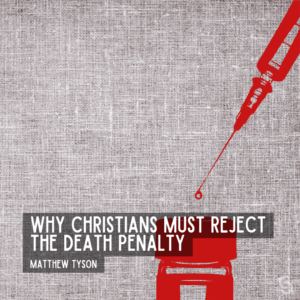 Allow me to begin with a direct and simple premise: For the Christian: the death penalty is inadmissible.
Allow me to begin with a direct and simple premise: For the Christian: the death penalty is inadmissible.
By this, I mean that the death penalty stands in opposition to the transformative power of Christ, the gospel’s message of redemption, and the mission handed down to Christians by Jesus himself. Capital punishment is not an act of legitimate defense nor one that enhances public safety. It is, however, an action in which a human willingly chooses the ending of a life over the salvation of it.
These statements do not come from a faith filtered through political conviction. Instead, they flow directly from the life and ministry of Christ Jesus — the Son of the living God who came to this earth to transform every strand of reality and direct it toward its ultimate divine purpose: to be united with God in all things and liberated from the oppression of sin. It is indeed sin that drives us to violence, and the death penalty is no exception.
The desire or willingness to commit violence — in any form — against another human originates from the darkest corners of our fallen humanity, even when aimed at someone we deem criminal. And yet, the death penalty continues to receive widespread support from many American Christians. It is therefore the goal of this essay to argue, to the fullest extent possible, why the Christian — regardless of denomination—must stand in opposition to capital punishment.
The way of Christ is the way of transformation
To get to the heart of this matter, we must begin with Christ and the Incarnation. For what reason was the Son incarnate? Why did He come to us in the flesh? “To save us from our sins” is the popular answer, and while true, there is a deeper understanding to be had.
Humanity was — and is — in need of saving: because of the fall, we are fractured, incomplete, unfulfilled, and incapable of true goodness without Him. Yet God could have offered salvation in any number of ways. He chose instead to come as one of us—as human. As we read in the Gospel of John, the Word became flesh, and in doing so, Christ experienced every nook, cranny, and corner of the human condition — death included.
Why? Because nothing can remain unchanged when touched by God. By taking on flesh, Christ perfectly and fully united humanity with the divine, opening the path to ultimate fulfillment in line with God’s will for His creation. By accepting Him and clinging to His Gospel, we too are touched — and thus transformed entirely. It is through this transformation that we find our salvation.
True transformation, of course, cannot be boiled down to a simple change in feeling or perspective. It is a complete reconfiguring of our entire approach to life and the relationships within it. When we reach to Christ and accept His grace, we are not asked merely to be better — we are asked to be different. To leave behind all that keeps us tethered to the darkness. One such thing the Christian must abandon is the desire for violence in all its forms.
Violence is a mark of a fallen world — an animalistic, graceless response to the difficulties of life from which humanity has long struggled to free itself. This was particularly evident during the time of Christ, who came during the height of the pagan Roman Empire, where — as in many civilizations of the pre-Christian world—violence was a constant undercurrent.
While most people today are not plagued with outright murderous tendencies, it is still instinctual to respond to harm with harm. We often desire retribution against those who hurt us, especially when we suffer physically or emotionally. And while we may dress this desire in the language of righteous justice, its roots often lie in the selfishness that stems from sin. It becomes a question of, “What do I get?” rather than “What can I give?”
It is from this untransformed perspective that the death penalty finds its footing. Though often presented as a fair response to the most heinous violations of human dignity, it is, at its core, a purposeful, life-ending act born from the same sinful source as all other violence. Even when cloaked in the language of righteousness, it is not in line with the teachings of Christ.
Take, for example, one of the most recognized passages from the Gospel of Matthew:
“You have heard that it was said, ‘An eye for an eye and a tooth for a tooth.’
But I say to you, offer no resistance to one who is evil.
When someone strikes you on your right cheek, turn the other one to him as well.
If anyone wants to go to law with you over your tunic, hand him your cloak as well.
Should anyone press you into service for one mile, go with him for two miles.
Give to the one who asks of you, and do not turn your back on one who wants to borrow.”
—Matthew 5:38–42
Christ is not offering a lofty ideal of nonviolence; He is laying out the framework for how His followers are to live and share His transformative, redeeming message. He begins with a clear rebuke of the old way: do not respond to violence with violence. Do not seek revenge for injury or insult. Notice, He does not tell us to lie down and be trampled upon — but rather to stand firm and turn the other cheek. This is not passivity; it is a radical act of resistance against a fallen world. It is a call to reject our “natural” tendencies toward vengeance and instead embrace the unnatural, divine call to peace.
But Christ doesn’t stop there. He pushes further: we are not only to resist violence — we are to go beyond it.
We are to love, serve, and give even to those who harm us. We are to live not through the lens of retribution but through the lens of humility, mercy, and forgiveness. This is the work of the redeemed life, and in living this way, we invite others into a transformative encounter with the Truth.
We are called to life, not death
If this is the way of Christ — if this is the path we have been called to follow—then how can we, as transformed believers, support the death penalty? It is a wholly anti-redemptive act that cuts short the possibility of salvation. Those handed the death penalty are arguably those in most need of redemption. Why, then, would any Christian advocate for denying them the opportunity to turn toward Christ? Should we not instead maximize our efforts to allow space and time for them to accept the gift of salvation?
I would challenge anyone who professes faith in Jesus to consider this seriously.
Some argue that Christians can support the death penalty for the sake of public safety. But even this doesn’t hold up under scrutiny. Today, we have the means to protect society from even the most dangerous offenders without resorting to execution. (There’s certainly more to say about the implementation and ethics of our prison systems, but that is beyond the scope of this essay.) The death penalty is not functionally necessary for public protection — so its use cannot be morally justified. To kill without necessity, for the sake of “an eye for an eye,” is not only destructive — it is thoroughly inhuman and antithetical to the gospel.
Others point to Romans 13 as evidence that capital punishment is biblically supported:
“For rulers are not a cause of fear to good conduct, but to evil.
Do you wish to have no fear of authority? Then do what is good and you will receive approval from it,
for it is a servant of God for your good. But if you do evil, be afraid,
for it does not bear the sword without purpose; it is the servant of God to inflict wrath on the evildoer.”
—Romans 13:3–4
Paul clearly acknowledges the role of the state in maintaining order and administering justice. But where in this passage does he endorse capital punishment? Where does he say it is good or right for the Christian to support it? At most, this is an acknowledgment of the reality of governance — not an ethical endorsement. Scripture is full of things God allows or tolerates for a time, which are ultimately transformed or nullified through Christ.
One could layer argument upon argument against the death penalty, but even without them, the central point remains: as transformed disciples of Christ, we are in the business of redemption and forgiveness. Our mission is to help lead every person we encounter to the truth of the Gospel. We do not deal in death — we deal in life. And we must let go of any desire or willingness to take life, even in the name of justice.
If we do not have hope in the salvation of all, then why call ourselves Christians at all?
 Matthew Tyson is a teacher, writer, and Catholic catechist living in central Alabama with his wife and five children. His topics of interest include social justice, labor rights, scripture, and mysticism. In his spare time, Matthew enjoys reading (especially Southern literature and espionage), cooking, fishing, and hiking. For questions or comments, you can email him at matthewallentyson@gmail.com.
Matthew Tyson is a teacher, writer, and Catholic catechist living in central Alabama with his wife and five children. His topics of interest include social justice, labor rights, scripture, and mysticism. In his spare time, Matthew enjoys reading (especially Southern literature and espionage), cooking, fishing, and hiking. For questions or comments, you can email him at matthewallentyson@gmail.com.


